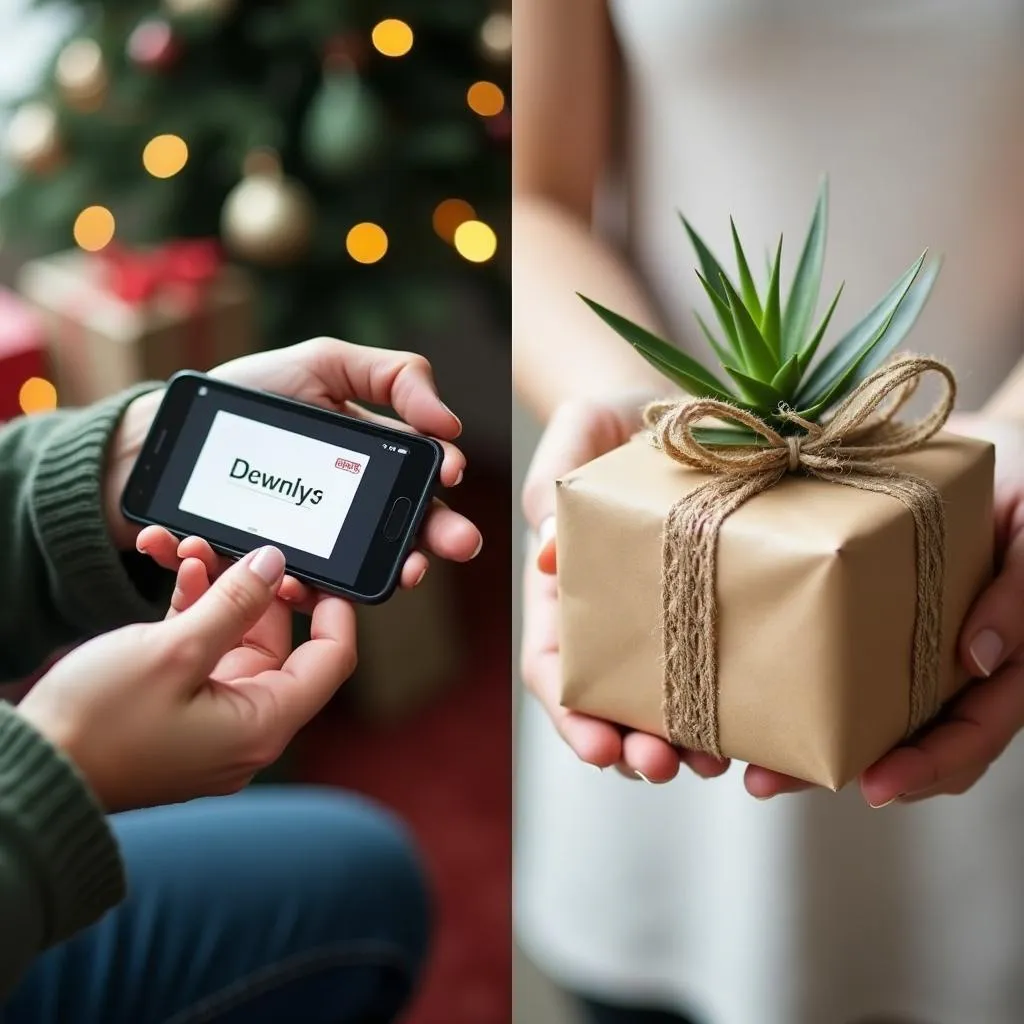The topic of receiving valuable gifts is a common theme in IELTS Speaking tests, particularly in Part 2. This subject allows candidates to showcase their ability to describe personal experiences, emotions, and cultural aspects related to gift-giving. Given its relevance to everyday life and its potential to elicit varied responses, this topic is likely to remain popular in future IELTS exams.
Nội dung bài viết
- Part 1: Introduction and Interview
- Question: Do you enjoy receiving gifts?
- Part 2: Long Turn
- Cue Card:
- Sample Answer (Band 8-9):
- Follow-up questions:
- Part 3: Two-way Discussion
- Question: How have gift-giving customs changed in your country over the years?
- Question: Do you think expensive gifts are always the best ones to give?
- Key Vocabulary and Phrases for High Scores
- Examiner’s Advice
Part 1: Introduction and Interview
In this section, the examiner may ask general questions about gifts. Here are some possible questions and a sample answer:
Question: Do you enjoy receiving gifts?
Sample answer (Band 7-8):
“Absolutely! I think receiving gifts is always a wonderful experience. It’s not just about the item itself, but the thought and effort behind it. I particularly appreciate gifts that show the giver has really considered my interests or needs. That said, I believe it’s equally important to be gracious and appreciative, regardless of what the gift is.”
Part 2: Long Turn
Cue Card:
Describe a time when you received a valuable gift.
You should say:
- What the gift was
- Who gave it to you
- Why it was valuable to you
- And explain how you felt when you received it
Sample Answer (Band 8-9):
“I’d like to talk about a particularly meaningful gift I received a few years ago. It was a vintage leather-bound journal, given to me by my grandmother on my 25th birthday.
The journal itself was exquisitely crafted, with a rich, deep brown cover and pages made of high-quality paper that had a slightly aged appearance. But what made it truly invaluable was its history. This journal had belonged to my great-grandfather, who was a prolific writer and traveler in his time.
My grandmother presented it to me because she knew about my passion for writing and my interest in family history. She felt that passing down this family heirloom would not only encourage my writing pursuits but also connect me more deeply to our family’s legacy.
The value of this gift far transcended its monetary worth. It was a tangible link to my ancestors, filled with the thoughts, observations, and experiences of a man I had never met but whose blood ran in my veins. It represented a wealth of knowledge and a window into the past that I found utterly fascinating.
When I received the journal, I was overwhelmed with emotion. I felt a profound sense of gratitude towards my grandmother for entrusting me with such a precious family artifact. There was also a feeling of responsibility – to preserve the journal and perhaps add my own chapters to our family’s story. The gift sparked a sense of wonder about the lives of those who came before me and ignited a curiosity to explore more of my family’s history.
In essence, this gift was more than just an object; it was a catalyst for self-discovery and a bridge between generations. It’s a possession I cherish deeply and one that continues to inspire and influence me in my writing journey.”
 Vintage leather-bound journal gift from grandmother
Vintage leather-bound journal gift from grandmother
Follow-up questions:
- How has this gift influenced your life since you received it?
Sample answer (Band 8-9):
“This gift has had a profound impact on my life in various ways. Firstly, it has deepened my appreciation for family history and genealogy. I’ve since embarked on researching our family tree, uncovering fascinating stories that have enriched my understanding of where I come from. Secondly, it has significantly influenced my writing style. Reading my great-grandfather’s eloquent prose has inspired me to refine my own writing techniques and experiment with different narrative styles. Lastly, it has instilled in me a greater sense of responsibility towards preserving family legacies and the importance of passing down stories and artifacts to future generations.”
- Do you think the value of a gift is always about its price?
Sample answer (Band 7-8):
“Not at all. While expensive gifts can certainly be impressive, I firmly believe that the true value of a gift lies in its emotional significance and the thought behind it. A handmade card or a book that aligns perfectly with the recipient’s interests can be far more valuable than a costly item chosen without much consideration. The most precious gifts are often those that demonstrate a deep understanding of the recipient’s personality, needs, or dreams. It’s the personal touch and the sentiment behind the gift that truly matter, rather than its price tag.”
Part 3: Two-way Discussion
Question: How have gift-giving customs changed in your country over the years?
Sample answer (Band 8-9):
“Gift-giving customs in my country have undergone significant transformations over the years, reflecting broader societal changes. Traditionally, gift-giving was often tied to cultural and religious festivals, with specific items being associated with particular occasions. However, in recent years, we’ve seen a shift towards more personalized and experience-based gifts.
One notable change is the increased influence of Western practices, such as celebrating birthdays with gifts, which wasn’t as common in the past. There’s also been a move away from purely material gifts towards experiential presents, such as concert tickets or travel vouchers. This shift reflects a growing preference for creating memories rather than accumulating possessions.
Another significant change is the rise of digital gifting. E-gift cards and online subscriptions have become increasingly popular, especially among younger generations. This trend has been accelerated by the recent global pandemic, which has made people more comfortable with digital transactions.
Moreover, there’s a growing awareness of sustainable and ethical gift-giving. Many people now prefer eco-friendly or locally-made gifts, reflecting a broader societal concern for environmental issues.
Lastly, social media has transformed the way we approach gift-giving. It’s now common to share images of gifts received or given, which has added a new dimension of public performance to what was once a more private exchange.
These changes reflect broader shifts in our society, including technological advancements, changing values, and evolving social norms. While the essence of gift-giving as an expression of care and connection remains, the forms it takes continue to evolve with our changing world.”
 Modern gift-giving trends: digital and sustainable
Modern gift-giving trends: digital and sustainable
Question: Do you think expensive gifts are always the best ones to give?
Sample answer (Band 7-8):
“In my opinion, expensive gifts are not necessarily the best ones to give. While high-priced items can certainly be impressive, the true value of a gift often lies in its thoughtfulness and personal significance rather than its cost.
Firstly, an expensive gift doesn’t always align with the recipient’s needs or preferences. A costly piece of technology might be wasted on someone who isn’t tech-savvy, for instance. On the other hand, a modestly priced book on a subject the recipient is passionate about could be far more appreciated.
Secondly, the context of the relationship and the occasion should be considered. Overly expensive gifts might make the recipient feel uncomfortable or obligated, especially if they can’t reciprocate at the same level. This can potentially strain relationships rather than strengthen them.
Moreover, some of the most cherished gifts are those that are handmade or personalized. These gifts, regardless of their monetary value, often carry more emotional weight because they represent time, effort, and personal attention from the giver.
That being said, there are certainly occasions where an expensive gift might be appropriate, such as for significant life milestones or in professional contexts. However, even in these cases, the thoughtfulness and appropriateness of the gift should be the primary consideration.
In conclusion, while expensive gifts can be suitable in some situations, they are not inherently the best choice. The ideal gift is one that demonstrates understanding, care, and consideration for the recipient, regardless of its price tag.”
Key Vocabulary and Phrases for High Scores
-
Exquisitely crafted [ɪkˈskwɪzɪtli krɑːftɪd] (adjective phrase): Made with great skill and attention to detail.
Example: “The antique vase was exquisitely crafted, showing the artisan’s remarkable skill.” -
Invaluable [ɪnˈvæljuəbl] (adjective): Extremely useful or indispensable.
Example: “Her mentor’s advice was invaluable in shaping her career.” -
Prolific [prəˈlɪfɪk] (adjective): Producing a great number or amount of something.
Example: “Shakespeare was a prolific playwright, producing numerous famous works.” -
Tangible link [ˈtændʒəbl lɪŋk] (noun phrase): A physical connection or association that can be perceived.
Example: “The old photographs provided a tangible link to her ancestor’s lives.” -
Catalyst for self-discovery [ˈkætəlɪst fɔːr ˌself dɪˈskʌvəri] (noun phrase): Something that prompts or accelerates personal growth and understanding.
Example: “Traveling alone became a catalyst for self-discovery, helping her understand her true passions.” -
To cherish deeply [tə ˈtʃerɪʃ ˈdiːpli] (verb phrase): To hold dear or value greatly.
Example: “He cherished deeply the memories of his childhood summers at the lake house.”
Examiner’s Advice
To achieve a high score in the IELTS Speaking test, particularly when discussing topics like receiving valuable gifts:
-
Develop your ideas fully: Don’t just mention what the gift was; explain its significance, your emotional response, and its impact on you.
-
Use a range of vocabulary: Incorporate advanced and topic-specific vocabulary naturally in your responses.
-
Maintain fluency: Practice speaking at length without long pauses or repetition.
-
Show flexibility: Be prepared to discuss the topic from various angles, including personal experiences and broader societal perspectives.
-
Use idiomatic language: Incorporate relevant idioms and colloquial expressions naturally to demonstrate language proficiency.
-
Provide specific examples: Use concrete examples to illustrate your points, making your responses more vivid and engaging.
-
Demonstrate critical thinking: In Part 3, analyze the questions deeply and provide nuanced, well-reasoned responses.
-
Practice regularly: Familiarize yourself with various topics and practice articulating your thoughts clearly and coherently.
Remember, the key to success in the IELTS Speaking test is not just about what you say, but how you say it. Confidence, clarity, and the ability to express complex ideas in a structured manner are crucial factors in achieving a high score.


